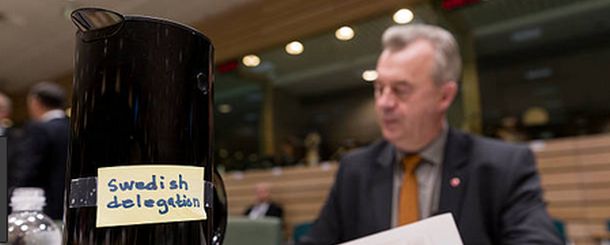
"Sweden considers that the proposed mandate does not meet the requirements of international law", the official government statement reads.
Photo: Swedish Minister for Rural Affairs, Sven-Erik Bucht, at a recent EU Council meeting.
Sweden has announced its opposition to the European Commission's sought mandate to start negotiations with Morocco for a new fisheries agreement.
The statement by the Minister for Rural Affairs Sven-Erik Bucht reads: Sweden announced to Coreper on February 14 that Sweden intends to vote no to give the EU Commission a mandate to open negotiations on a new protocol to the EU Fisheries Partnership Agreement with Morocco. This is because Sweden considers that the proposed mandate does not meet the requirements of international law. The position is identical to previous Swedish behavior in the matter. Sweden also voted in 2012 not to give the European Commission a negotiating mandate for a new protocol.
Read the original text of the statement here (in Swedish).
The current fisheries protocol, set to expire in July 2018, is currently under review by the European Court of Justice. In January, the Advocate General of the Court presented his Opinion on the protocol, calling it "invalid". Over 90% of the EU's fishing activity under the deal takes place in the waters of Western Sahara, not in Morocco, the Advocate General's Opinion reads. As such, he concluded, the EU violates several legal principles, including the right of the people of Western Sahara to self-determination. The Court will present its judgment on 27 February.
The announcement of the Swedish government came as the mandate appeared on the agenda of COREPER (Committee of Permanent Representations of the EU). A decisive vote on the mandate at the level of the EU Ministers is expected next week.
"Sweden's position seems to have evolved towards one that is more compliant with international law and the CJEU ruling since that it had conditionally agreed to the opening of negotiations on the agriculture agreement. It is good to see Sweden take a firm position - one we we hope it will translate into national policy by issuing clear guidance to Swedish companies not to engage in Western Sahara", says Sara Eyckmans, coordinator of Western Sahara Resource Watch. Read WSRW's report on Swedish companies involvement in Western Sahara here.
In May 2017, Sweden was also the only EU Member State to issue a critical statement with regard to the EU Commission's request to be mandated to open negotiations with Morocco to cover trade with Western Sahara. Read that statement here. The Commission's move came on the back of a ruling by the EU Court of Justice in December 2016, concluding that no EU-Morocco trade or association deal could be applied to Western Sahara unless with the explicit consent of the people of the territory.
Sweden has before taken a position that is rooted in law and respect for the people of Western Sahara's right to self-determination. In 2012, Sweden was one of several EU Member States to vote against the EU-Morocco fisheries protocol. Other countries that did not support the deal back then were the UK, Netherlands, Denmark, Finland, Austria and Cyprus.
EU Parliament to hold Western Sahara debates at committee level?
The European Parliament has expressed itself in favour of holding debates in three parliament committees about the exclusion of Western Sahara from EU-Morocco trade agreements.
Here is the EU Council's legal advice on fishing in occupied waters
Hans Corell criticizes EU fisheries in Western Sahara
The former Legal Counsel to the UN Security Counsel, Mr. Hans Corell, comments on the EU's fisheries activities in Western Sahara.
EU elections: how have candidates voted on occupied Western Sahara?
Are you casting your vote for the EU elections? Find here a complete overview of MEP candidates who have supported the Moroccan occupation of Western Sahara in previous controversial votes. Choose wisely.


